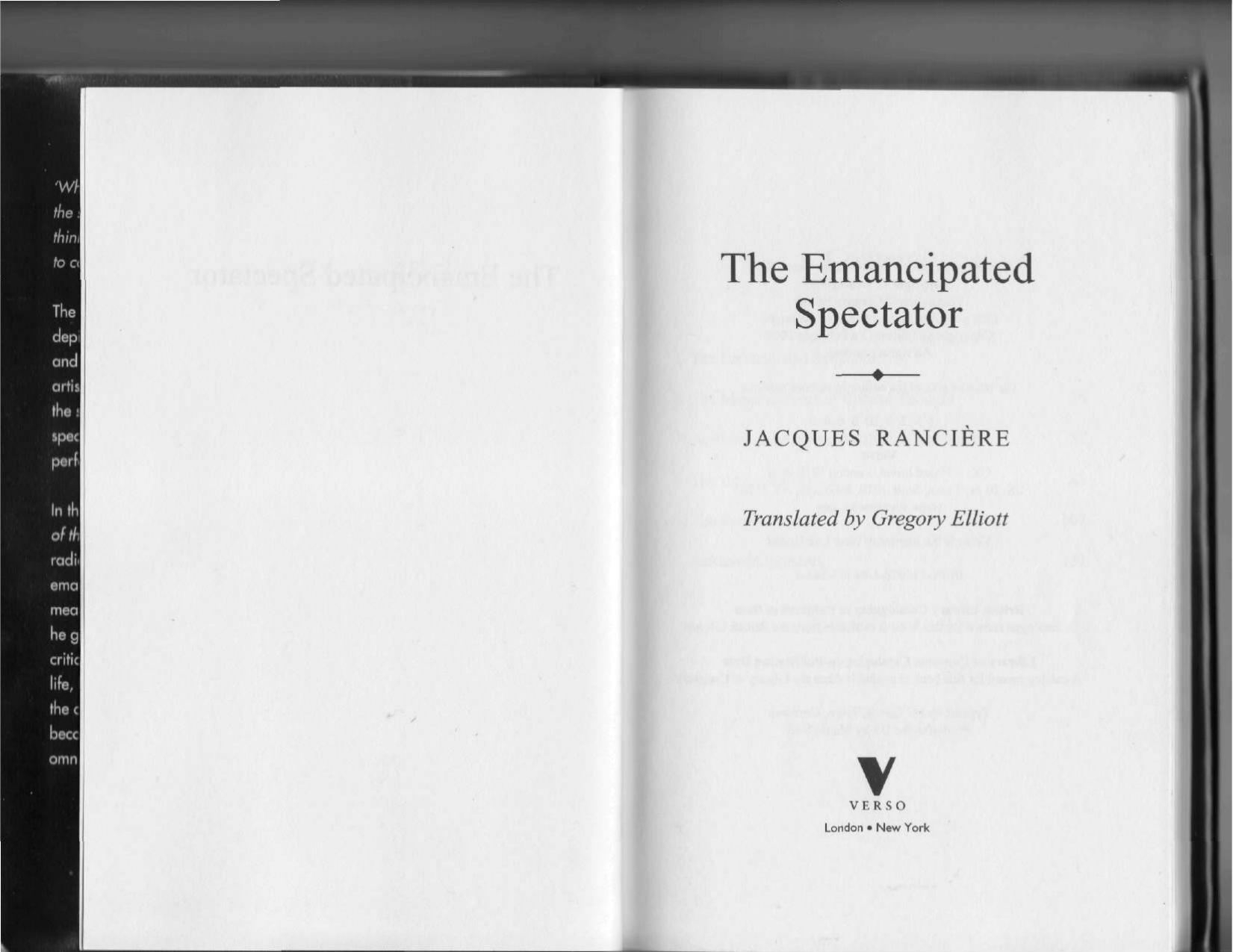The Emancipated Spectator by Jacques Ranciere

Author:Jacques Ranciere
Language: eng
Format: epub, pdf
Publisher: Verso Books
Published: 2014-04-08T04:00:00+00:00
This is what the aesthetic rupture produced: the appropriation of the place of work and exploitation as the site of a free gaze. It does not involve an illusion but is a matter of shaping a new body and a new sensorium for oneself. Being a worker meant a certain form of correspondence between a sensory equipment and its destination. It meant a determinate body, a determinate coordination between the gaze and the arms. The divorce between the labouring arms and the distracted gaze introduces the body of a worker into a new configuration of the sensible; it overthrows the ‘right’ relationship between what a body ‘can’ do and what it cannot. It is no coincidence that this apparently apolitical description was published in a workers’ revolutionary newspaper: the possibility of a ‘voice of the workers’ was conditional upon disqualification of a certain worker’s body. It was conditional upon the redistribution of the whole set of relationships between capacities and incapacities that define the ‘ethos’ of a social body. This is also why the same joiner recommends specific readings to his friends: not novels engaging with social issues, but the stories of those romantic characters – Werther, René, Obermann – who suffered from the misfortune that by definition is denied to the worker: the misfortune of having no occupation, of not being equipped for any specific place in society. What literature does is not provide messages or representations that make workers aware of their condition. Rather, it triggers new passions, which means new forms of balance – or imbalance – between an occupation and the sensory equipment appropriate to it. This politics of literature is not the politics of writers: Goethe, Chateaubriand or Senancour certainly did not want to arouse such passions among labourers. It is a politics inherent in literature as an art of writing that has broken the rules which make definite forms of feeling and expression correspond to specific characters or subject matters.
Aesthetic experience has a political effect to the extent that the loss of destination it presupposes disrupts the way in which bodies fit their functions and destinations. What it produces is not rhetorical persuasion about what must be done. Nor is it the framing of a collective body. It is a multiplication of connections and disconnections that reframe the relation between bodies, the world they live in and the way in which they are ‘equipped’ to adapt to it. It is a multiplicity of folds and gaps in the fabric of common experience that change the cartography of the perceptible, the thinkable and the feasible. As such, it allows for new modes of political construction of common objects and new possibilities of collective enunciation. However, this political effect occurs under the condition of an original disjunction, an original effect, which is the suspension of any direct relationship between cause and effect. The aesthetic effect is initially an effect of dis-identification. The aesthetic community is a community of dis-identified persons. As such, it is political because political subjectivation proceeds via a process of dis-identification.
Download
The Emancipated Spectator by Jacques Ranciere.pdf
This site does not store any files on its server. We only index and link to content provided by other sites. Please contact the content providers to delete copyright contents if any and email us, we'll remove relevant links or contents immediately.
| Anthropology | Archaeology |
| Philosophy | Politics & Government |
| Social Sciences | Sociology |
| Women's Studies |
The remains of the day by Kazuo Ishiguro(7617)
Tools of Titans by Timothy Ferriss(7017)
The Black Swan by Nassim Nicholas Taleb(6252)
Giovanni's Room by James Baldwin(5956)
Inner Engineering: A Yogi's Guide to Joy by Sadhguru(5942)
The Way of Zen by Alan W. Watts(5841)
The Six Wives Of Henry VIII (WOMEN IN HISTORY) by Fraser Antonia(4824)
The Power of Now: A Guide to Spiritual Enlightenment by Eckhart Tolle(4804)
Astrophysics for People in a Hurry by Neil DeGrasse Tyson(4650)
Asking the Right Questions: A Guide to Critical Thinking by M. Neil Browne & Stuart M. Keeley(4636)
12 Rules for Life by Jordan B. Peterson(3792)
The Ethical Slut by Janet W. Hardy(3544)
Skin in the Game by Nassim Nicholas Taleb(3512)
Housekeeping by Marilynne Robinson(3451)
The Art of Happiness by The Dalai Lama(3417)
Double Down (Diary of a Wimpy Kid Book 11) by Jeff Kinney(3313)
Skin in the Game: Hidden Asymmetries in Daily Life by Nassim Nicholas Taleb(3297)
Walking by Henry David Thoreau(3260)
12 Rules for Life: An Antidote to Chaos by Jordan B. Peterson(3221)
